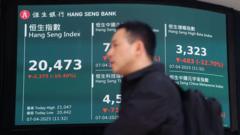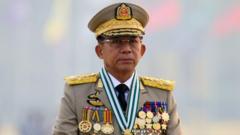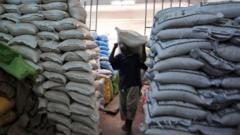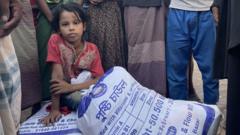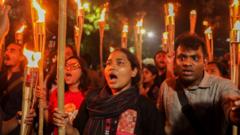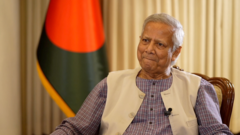The ban underscores the deepening political crisis in Bangladesh following the ousting of Sheikh Hasina, as calls for justice and accountability grow louder.
**Bangladesh's Interim Government Cracks Down on Awami League Amid Ongoing Turmoil**

**Bangladesh's Interim Government Cracks Down on Awami League Amid Ongoing Turmoil**
In a decisive move, Bangladesh's interim government forbids the Awami League and its activities, a direct response to last summer's uprising.
On May 11, 2025, the interim government of Bangladesh declared a ban on all activities of the Awami League, the former ruling party led by the ousted Prime Minister Sheikh Hasina, under the Anti-Terrorism Act. This action comes as the country seeks to stabilize following a mass uprising last summer, which was fueled by widespread discontent with Hasina's authoritarian regime. Nobel laureate Muhammad Yunus currently heads this interim government, which has faced mass protests demanding justice for the victims of state violence.
Sheikh Hasina, having fled to India in the aftermath of the protests, left behind a party that continues to exert influence within Bangladeshi politics. The government’s action was precipitated by recent violence attributed to Awami League members against popular protest leader Hasnat Abdullah, igniting further calls for action against the party. "Our ultimate goal is to see that the Awami League is banned," Abdullah declared to the crowds rallying in Dhaka, reinforcing the sentiments of many demonstrators who sought accountability and retribution against the party's leadership.
The rally saw participation from hundreds, including injured students from previous protests, united in their demand for a permanent ban on the Awami League. Various political factions, including student groups from Jamaat-e-Islami and the nonpolitical organization Hefazat-e-Islam, gained momentum alongside the protests. Law Minister Asif Nazrul subsequently confirmed the government's intention to restrict Awami League activities until investigations and trials at the International Crimes Tribunal are concluded.
The tribunal has been tasked with addressing allegations of crimes committed by Awami League members during the 2024 protests, with reports from inquiry commissions indicating a troubling pattern of state-sanctioned violence, including mass disappearances and fatalities among protestors. While the Awami League responded by questioning the legitimacy of the interim government, it remains clear that political tensions in Bangladesh are unlikely to ease in the near future.
Amid these escalating events, citizens remain vigilant, calling for enduring change in a nation grappled by political instability and human rights concerns since Hasina's departure.
Sheikh Hasina, having fled to India in the aftermath of the protests, left behind a party that continues to exert influence within Bangladeshi politics. The government’s action was precipitated by recent violence attributed to Awami League members against popular protest leader Hasnat Abdullah, igniting further calls for action against the party. "Our ultimate goal is to see that the Awami League is banned," Abdullah declared to the crowds rallying in Dhaka, reinforcing the sentiments of many demonstrators who sought accountability and retribution against the party's leadership.
The rally saw participation from hundreds, including injured students from previous protests, united in their demand for a permanent ban on the Awami League. Various political factions, including student groups from Jamaat-e-Islami and the nonpolitical organization Hefazat-e-Islam, gained momentum alongside the protests. Law Minister Asif Nazrul subsequently confirmed the government's intention to restrict Awami League activities until investigations and trials at the International Crimes Tribunal are concluded.
The tribunal has been tasked with addressing allegations of crimes committed by Awami League members during the 2024 protests, with reports from inquiry commissions indicating a troubling pattern of state-sanctioned violence, including mass disappearances and fatalities among protestors. While the Awami League responded by questioning the legitimacy of the interim government, it remains clear that political tensions in Bangladesh are unlikely to ease in the near future.
Amid these escalating events, citizens remain vigilant, calling for enduring change in a nation grappled by political instability and human rights concerns since Hasina's departure.






